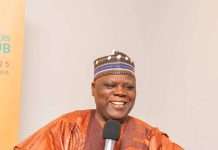
Pharm. Luke Adeeko is an octogenarian pharmacist and Fellow of the Pharmaceutical Society of Nigeria (PSN). Now a resident of the United States, Adeeko shares some of his life experiences, including his background, education and the highlights of his career, with Moses Dike. Excerpts:
It is our pleasure to welcome you to our Senior Citizen column. Kindly tell us about yourself, your childhood experiences, education and the events that have helped to shape your adult personality.
My name is Luke Bolade Adeeko. I was born on 18 October 1943, in Abeokuta, capital of the present day Ogun State. I am the third of eight children of my late parents – Mr Lawrence and Mrs Sabina Adeeko. I am a Christian of the catholic denomination.
I started my primary school education in 1950, at St. Augustine Primary School, Itesi, Abeokuta. My primary school sojourn continued at St. Thomas Primary School, Kano, from 1951 to 1953; then St. Matthias Primary School, Lafiaji, Lagos from 1954 to 1956, and ending in Abeokuta in 1956.
I gained admission into two secondary schools in 1957. However, my father, being the staunch Catholic he was, insisted I must attend a Catholic secondary school. In order to repeat entrance examinations in 1957, he enrolled me in a Catholic “modern” school. Luckily for me, I gained admission into Loyola College, Ibadan. I was at Loyola College from 1958 to 1964 for my WAEC and HSC.
In 1965, I worked as a technical assistant at the then WNTV/WNBS (Western Nigerian TV/Western Nigerian Broadcasting Service), Ibadan. I taught Chemistry and Maths for nine months in 1966. In that same 1966, I got admitted to the then University of Ife (Ibadan Campus) to study Pharmacy. I graduated in 1970.
Part of my childhood experiences included having to go with my dad on his numerous transfers as a produce examiner. This took me to various towns and cities in the old Western Region, old Northern Region and the Lagos Colony, as it was known then.
My working at WNTV in 1965 was an eye-opening experience for me, as I had to save to kick-start funding my education at Ife, having lost my dad three months to WAEC examination in 1962. This influenced my prudent financial management in later years.
The most profound experience that helped the most in shaping my adult life and personality was the very strict moral, intellectual and religious discipline I got during my years at Loyola College. They were very profound.
As an octogenarian, how has age affected your lifestyle and how are you adjusting to the realities of old age?
Becoming an octogenarian has not really affected my lifestyle per se. Lifestyle entails what you do, engage in, or are known for, positively or negatively. For example, I have never used any form of tobacco in my life. I am a teetotaler, and I still profess my Catholic faith to date.
Ageing, however, forces some changes on you – if you want to live a long, healthy life, with God’s help, mercy and protection. You have to adjust your food – what you eat, the quality and quantity of what you eat, and when you eat.
You have to adjust your sleep schedule. Get used to and adjust to the sometimes uncomfortable, unavoidable, age-related ailments and how to manage them. Get tuned to exercises to keep cracking bones and aching body in good shape.
What informed your choice of Pharmacy as a career? Did you have role models back then who motivated you to take the decision?
I did not have any role model back then that influenced my choice of Pharmacy as a career. It was a decision I made myself – the result of a career talk we had in my final year in secondary school.
In fact, my love for Pharmacy as a career was so strong that I didn’t mind doing a one year pre-Pharmacy programme, called “Prelim” in those days. This was because I had grade E in Physics in my HSC final exam.
Can you tell us a little about your professional career, especially the most memorable moments? Why are these moments important to you?
I graduated in 1970 and did my one year pre-registration internship with the then Glaxo Nigeria Ltd., in Apapa, Lagos. After my internship, I joined the then Ciba-Geigy Nigeria Ltd., as a medical representative, rising through the ranks to become the marketing manager. That was the position I held till I left the company in 1981. I started Subola Pharmacy Ltd, a wholesale and retail pharmaceutical company in 1982.
My years with Ciba-Geigy were very memorable. The company was reputable for its very strict policy then, of engaging only pharmacists as medical reps. I had very thorough, in-depth, training – both locally and abroad – in all aspects pharmaceutical sales and services, marketing and management. The knowledge acquired over those years stood me in good stead in managing my own company.
How active were you in Pharmacy-related activities?
During my professional career, I was involved in various pharmaceutical activities. I was a member of the Lagos State Task Force on Fake and Counterfeit Drugs and Unwholesome Foods, from year 2000 to 2013. I was a member of the Pharmaceutical Inspection Committee, representing Lagos State PSN, from 2000 to 2015.
I became a member of PSN Privileges Committee 1994. I was a member of PSN Law and Ethics Committee (from 2007 to 2009) and PSN Ad hoc Committee on 3rd M&B award for Excellence in Pharmacy (in 2007). I also received the Lagos State PSN Merit Award in 2000, and was presented with the Lagos State PSN Distinguished Pharmacist Award in 2006.
I was awarded PSN Fellowship in 2009 and between 2011 and 2014, I served as a member of the Lagos State Primary Health Care Board (PHCB).These were the high points of my professional career that were memorable.
My varied experiences in these positions gave me an insight into the problems bedevilling Pharmacy and pharmaceutical practice in Nigeria. The politics and intrigues of pharmaceutical and healthcare management in Lagos State, in particular, and Nigeria in general became clearer to me.
How do you relax? Tell us about some of the pastime activities and lifestyle modifications you have adopted to stay fit and active?
As I said earlier, ageing forces some lifestyle modifications on you. I relax mostly by reading and keeping abreast of social, political and professional events on social media to keep my brain alive and alert. Most importantly, I keep physically active to prevent atrophy of the joints and to enhance good blood flow through the body.
I take daily 30 minutes to one hour walk, to stay fit and reduce the risk of a fall, which can be deadly for geriatrics. Martin Luther King Jr once said, “If you can’t run, walk; if you can’t walk, crawl, but by all means keep moving”. This could be a panacea for many ailments of old age.
Tell us about your family. Did any of your children take after you to study Pharmacy or other health-related professions?
My wife of almost 50 years (we married 21 December 1974), is a 1976 graduate of the University of Lagos with B.Sc and M.Sc degrees in Chemistry and Analytical Chemistry, respectively. She worked with NAFDAC, under the Federal Ministry of Health for some years, before joining EXXONMOBIL, from where she retired as head/manager of Quality Assurance.
None of my three children is into Pharmacy. However, one of my two daughters took a B.Sc. degree in Nursing, after an earlier B.Sc. in Medical Lab. Technology. She is a clinical research nurse, working with research hospitals and pharmaceutical companies. The others are doing well in their non-medical areas of IT and travel and tours management.
Finally, given your wealth of experience, what advice would you like to give to the younger generation of pharmacists on how to make the best use of their calling as healthcare professionals to impact humanity positively?
As a very important and strategic link in the healthcare delivery chain, pharmacists should endeavour to play a role that will make such delivery seamless and worthwhile.
However, pharmacy practice in Nigeria has faced, and still faces challenges that have made professional and ethical service delivery a herculean task. These challenges have led some pharmacists, especially our younger ones, to engage in sharp, unethical, practices to make quick gains.
Our younger generation of pharmacists, especially those in hospital and retail practice, should strive at all times to be ethically professional in their service delivery. They are the mirror through which the public see, assess, and judge pharmacists and pharmacy practice. The welfare, well-being, and wellness of the general populace should be their primary objective. No cutting corners, and no sharp practices in order to make quick money. I would admonish them to make haste slowly.
Service built on honesty, integrity, and empathy will have a lasting impact on humanity, and leave an indelible positive trademark for pharmacists and the pharmacy profession. Honour, integrity and morality should be the hallmark of our service delivery as pharmacists to humanity. After all, what is life without honour? As the saying goes “ Life is honour; it ends when honour ends.”










